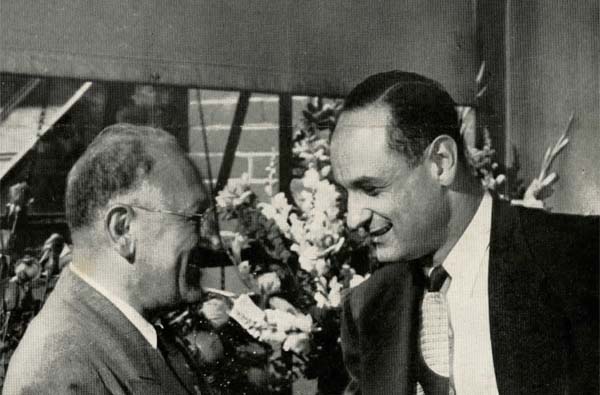
Israel Levinson (1863-1917) immigrated to the United States from Kovno, Lithuania, in 1887 and lived with Jacob Treelisky, a Lithuanian immigrant who ran a dairy farm in Panther Hollow. Levinson took a job building city sidewalks with a construction crew whose predominately Irish members called him “Jim,” a nickname he kept for life. About 1888, Jim Levinson married Rachel Caplan, the sister of a fellow immigrant at the Treelisky farm. Levinson and Caplan corresponded briefly by mail before he paid to bring her to Pittsburgh from Kovno. Jim and Rachel Levinson lived at 83 Spring Way in the Strip District before moving to a one-story house at 33 Pride Street in Uptown in 1895.
About 1902, Jim Levinson began selling scrap steel, old copper and brass and used tires by horse and wagon around the Hill District, using an empty lot next to his Pride Street house as a scrapyard. “I remember the scrap yard distinctly,” his grandson Aaron P. Levinson recalled in his 1987 memoir If Only Right Now Could Be Forever. “In one part of it were piles of old tires. In another part was a shear for cutting metal. Up and down, up and down, chopping scrap, frightening and fascinating me as a little boy.” The family later moved to nearby Locust Street but kept the office and scrap yard at 33 Pride Street.
Jim and Rachel Levinson had seven children. The eldest, Samuel “Sam” Levinson (1890-1965), graduated from Fifth Avenue High School and worked as a bookkeeper for the Caplan Bakery for about four years before becoming a salesman for the wholesale grocery firm Heller & Perrin. In 1913, Sam Levinson married Rose Reuben (1892-1981), whom he had met at a basketball game. Her father Isaac Reuben was a rabbi and teacher at Beth Jacob Congregation in the Hill District. After graduating from Fifth Avenue High School, Rose Reuben worked as a secretary at the Macbeth-Evans Glass Company, at the same time that Alexander Silverman was working there, and taught typing classes at the Fifth Avenue Evening School. “Interesting people, they were quite different from one another,” Aaron P. Levinson wrote. “Sam was outgoing, brilliant, keenly humorous, hard driving. Rose exuded sensitivity, modesty, humility and quiet dignity.” Rose Levinson volunteered at the Home for Crippled Children, now the Children’s Institute of Pittsburgh, from 1947 until shortly before her death.
Sam and Rose Levinson had three children, Aaron P. Levinson (1914-2002), June Levinson Siegel (Jan. 27, 1919-2005) and Netta Levinson Grollman (b.1930). The family moved to Oakland and then to Squirrel Hill, where Aaron became close friends with Ralph Raphael, the son of Raphael Electric Company President Ben Raphael.
In 1917, after Jim Levinson died, Sam Levinson and his brother Abraham “Abe” Levinson took over the scrap business. They transitioned the company from scrap into steel production, incorporating the Levinson Steel Company in 1926. They closed the Pride Street scrap yard and opened a fabrication plant at 23rd and Josephine Streets in the South Side. Their brothers Jacob and Emanuel also joined the company during this time.
Aaron P. Levinson began working at the company in 1933, working for his uncle Abe Levinson in the shop office for $18 a week. In 1938, Aaron Levinson took over the company’s newly launched distribution business. He became president of Levinson Steel Company in 1950.
At its peak, Levinson Steel was the 11th largest steel manufacturer in the country, employing some 3,000 people, including the collegiate football star Frank Glick. Its notable contracts included Giants Stadium and the World Trade Center. Levinson Steel closed its plants in the South Side and Ambridge in 1980 and sold its distribution unit in 1983. The new owner made an unsuccessful expansion effort and filed for bankruptcy protection in 1990. In 1998, Levinson Steel Company was sold to Metals USA.
Aaron P. Levinson married Sonia Zaludkowski. Aaron and Sonia Levinson had two children, Jim and Eleanor. Aaron’s cousin Joel Levinson was an avid photographer, particularly of the Pittsburgh scene.
Bibliography
Rauh Jewish Archives
- Levinson Steel Company records [MSS 1042] (catalog record).
- Levinson Steel Co. materials, from Corinne Azen Krause Photographs [MSP 113] (catalog record).
- Levinson Steel Co. materials, from Allegheny Conference On Community Development (Pittsburgh, Pa.), Records [MSS 285] (catalog record).
- Levinson Steel Co. materials, from Kaufmann’s Department Store Photographs [MSP 371] (catalog record).
- Levinson Steel Co. materials, from Eichleay Engineering Corporation Records [MSS 960] (catalog record).
- Levinson Steel Co. materials, from Hebrew Institute Records [MSS 512] (catalog record).
- Aaron Levinson materials, from Atlas family papers [MSS 0397] (catalog record).
- Aaron Levinson materials, from Atlas family photographs [MSP 0397] (catalog record).
- Emanuel Levinson obituary file (catalog record).
- Marion Friedman Levinson obituary file (catalog record).
- Joel B. Levinson obituary file (catalog record).
- Aaron P. Levinson obituary file (catalog record).
- Levinson, Aaron P. “If only right now could be forever” Hillsboro, Ore. : Media Weavers, c1987. [F159.26 .L665] (catalog record).
- Lynn Johnson, Joel B. Levinson. “Pittsburgh Moments,” Pittsburgh, Pa. : University of Pittsburgh Press, c1984. [F159.15 1984 .J66 q] (catalog record).
- “Pittsburgh, Views Between the Rivers,” F159 .P643 P574 1991 long] (catalog record).
- “Men and women of wartime Pittsburgh and environs” [F159.15 1945 .H293 f] (catalog record) (online).
University of Pittsburgh Archives & Special Collections
- Joel B. Levinson Photographs (online).
- Aaron P. Levinson oral history (June 20, 1977) [ais196440.269] (online).
- Rose Levinson oral history (May 4, 1977) [ais196440.272] (online).
Library of Congress
- Levinson Steel Company materials (online).
Exhibit history
- Author: Eric Lidji
- Original: August 27, 2014
- Current: February 23, 2026
